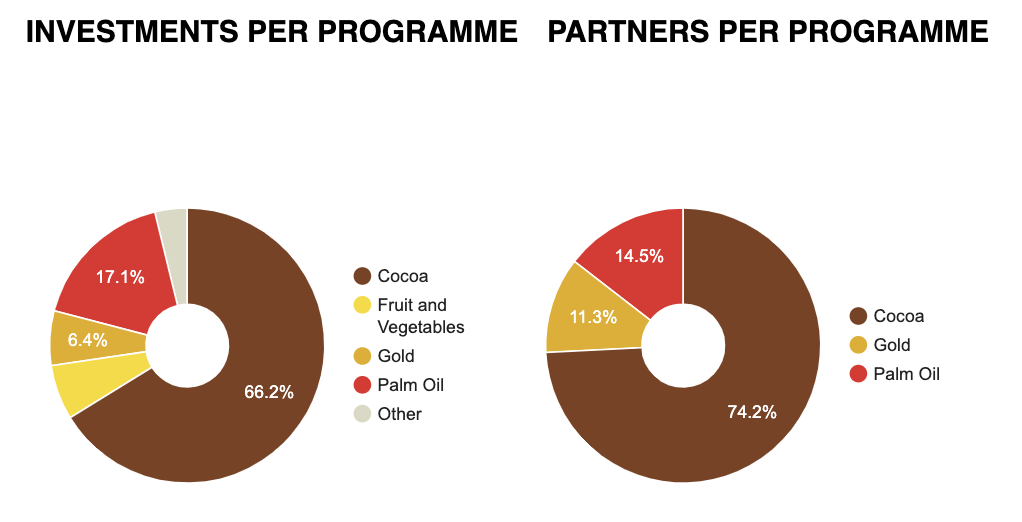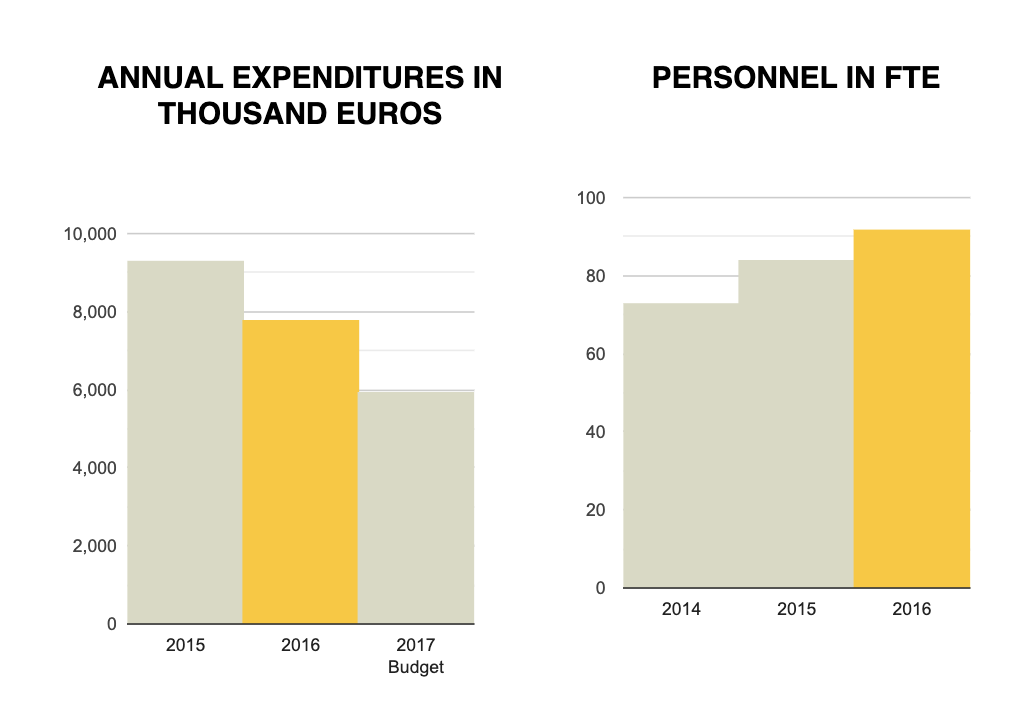Solidaridad promoted the adoption of sustainable mining practices by introducing fair mining standards to artisanal small-scale mines. Programmes were designed to improve the livelihoods of small-scale artisanal miners and their communities. Additionally, Solidaridad worked with miners to adopt occupational health and safety standards. Through various partnerships, interventions moved women’s economic empowerment and access to reproductive health services forward. Solidaridad’s enabling policy interventions contributed to national discussions on land management issues in the small-scale mining sector.

DEVELOPMENTS
Agriculture remains the main driver of economic development in the region. It accounts for a third of the region’s Gross Domestic Product (GDP) and employs an average 60 percent of the population. Agricultural growth has been driven mainly by area expansion as opposed to crop intensification and rehabilitation through the use of technology.
The rapid urbanization and population growth over the past half century have worsened food and nutrition security given the already low agricultural production. The region’s growth continues to be hampered by factors impacting negatively on productivity and livelihoods. Non-commercialized farming systems, land tenure, poor storage, poor transportation network, climate change effects and general degradation of natural resources are among the factors affecting agriculture.
The region, however, has enormous human and natural resource potential to address these challenges. The African Union, in response to the challenges, adopted the Comprehensive Africa Agriculture Development Programme (CAADP). CAADP aims to sustain the annual agricultural sector GDP growth rate of 6 percent among ECOWAS member states whilst improving the productivity and competitiveness of the sector. To further accelerate growth in agricultural production and productivity, most governments are pursuing green revolution agendas, growing the service sector and meeting acceptable production standards for effective integration into regional and international markets.

ACHIEVEMENTS
Together with partners (public and private), Solidaridad contributed to improving the incomes and skills of various producers and building stronger communities and a more resilient ecosystem around the commodity supply chains that Solidaridad engaged in – namely, cocoa, palm oil, maize and gold. Some key achievements include
- Increased productivity of over 66,000 smallholders working in cocoa from an average of 450kg/ha to 900kg/ha in Ghana; oil palm smallholder productivity increased from 5 tons/ha to 18 tons/hectare in Ghana, Nigeria and Cote d’Ivoire. The business case for investing in these commodities has been confirmed to drive sector investments.
- Increased cocoa farmers’ access to intensification and rehabilitation services through 20 privately operated rural service centres (RSC) in Ghana validated the RSC mechanism as a successful service delivery model for broader adoption.
- Facilitated the revival of the Oil Palm Development Association of Ghana (OPDAG) which was defunct for years. OPDAG commenced engagement with the government for the establishment of an Oil Palm Board to serve as regulator for the sector in Ghana.
- Provided technical support to Ghana, Liberia and Cote d’Ivoire in the TFA 2020 national government engagement processes towards the adoption of a zero net deforestation oil palm production system.
- Partnered with Mondelez in over 200 communities in Cote d’Ivoire to develop community action plans to contribute to creating thriving cocoa communities through investments in crop diversification, youth employment and advocacy, education, women empowerment and environmental sustainability.
- Maize productivity was enhanced to improve food security. We partnered MASARA N’Arziki farmers association to build the capacity of farmers in conservation agriculture and good agronomic practices. This addresses also climate change impacts. Over 11,000 cooperative farmers benefited from these interventions. Average productivity increased by 114% (from 2.1 tons per hectare in 2013 to 4.5 tons per hectare in 2016. Warehousing facilities were constructed to reduce post-harvest losses.

PARTNERSHIPS
By collaborating with a broad network of partners, Solidaridad was able to impact the lives of producers (includes women) and empowered them while creating resilience in supply chains and improving food security and nutrition. The Dutch Embassy (EKN) in Ghana continued to be a key investor in our programmes. IDH and the Swiss government co-invested in the CORIP. Other private cocoa companies including Olam, Ecom, Cargill, Twin Trading, Wienco, EMFED, Touton contributed to the CORIP innovation development alongside Ghana Cocobod and IFDC.
Solidaridad also partnered with the MasterCard Foundation (MCF) to demonstrate the employment opportunities for young people in the cocoa supply chain. Ghana COCOBOD, Ashesi University, Aflatoun, Fidelity Bank and Opportunity International are implementing partners. The learning partners are Overseas Development Institute (ODI) and Participatory Development Associates (PDA). Solidaridad has engaged with Mondelez and the Conseil du Café-Cacao (CCC) to promote a sustainable and inclusive cocoa economy for Cote d’Ivoire.
A strong partnership with the RSPO Smallholder Support Fund is supporting 5,000 smallholders in Cote d’Ivoire, Ghana and Nigeria towards RSPO certification. The region worked with the International Plant Nutrition Institute (IPNI) on the demonstration of best management practices (BMP) at the industrial plantation level.
To promote sustainable palm oil development, Solidaridad is actively involved in the TFA 2020 activities in Ghana, Cote d’Ivoire and Liberia. In Sierra Leone, Solidaridad partnered with Natural Habitats Group and DFID to roll out the “Voluntary Guidelines on responsible Governance of Tenure” (VGGT) framework in close collaboration with the Ministry of Agriculture.
ORGANIZATION
Solidaridad West Africa expanded its operations to Liberia and Sierra Leone, in addition to the existing programmes in Ghana, Cote d’Ivoire, Nigeria and Cameroon. New staff was recruited in Liberia and Sierra Leone. Additional staff was hired in Cote d’Ivoire for the Cocoa Life Programme funded by Mondelez. The total staff number increased by 17% (from 84 in 2015 to 98).
The internal capacity was further enhanced with the engagement of a Learning, Innovation and Impact expert to provide a high-level support in documenting and disseminating successful results and experience.
Selected programme staff attended diverse training courses, conferences, workshops and programmes in-country and abroad. The programmes were primarily on gender, business incubation, financial inclusion, entrepreneurship, climate change and landscape management.
Financial performance in the region was satisfactory. Solidaridad West Africa exceeded its budgeted income by 24% (budgeted income was euro 6.2m while the actual was euro 7.7m). Expenditures declined by 17% in 2016. (Actual expenditure was euro 7.7m while planned expenditure was euro 9.3m). This sharp decline was due to the completion of SWAPP and a number of cocoa sustainability projects implemented with private cocoa industry funds.


